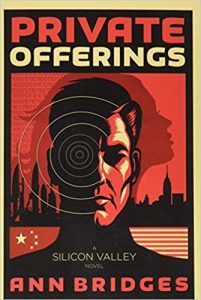David Dubrow's Blog, page 18
November 15, 2017
Odds and Ends 11/15/2017
Thanksgiving’s almost here, so between holiday preparations and family time I won’t have much more than a book review next week. Don’t worry: you’ll like both the review and the book. For now, some odds and ends.
—
 Regular readers know that I’m an avid reader of news and politics, as they’re informed by our common culture. If you don’t like how politics are currently being practiced, all you have to do is glance at the coarsening of our culture to see why. It’s not a coincidence, for example, that Hollywood bigwig Harvey Weinstein is (or was) a big political donor and bundler. With that in mind, the sickening allegations made by multiple women against U.S. Senate candidate Roy Moore are too big an issue to tackle in hot takes and sound bites, despite multiple attempts to do so by moral preeners on every side of the political aisle. Nobody has a right to be believed. Nobody. This includes accusers and defendants, particularly politicians. You may have a right to be heard, but you don’t have a right to be believed, no matter what charges you levy. I don’t believe the word of anyone I don’t personally know or vouch for, but I do believe in facts and evidence. The Washington Post‘s institutional loathing of conservatives like Moore make these allegations difficult to take at face value. On the other hand, why would these women lie? And Moore’s own demurrals seem pro forma, at best. It’s ugly and horrible across the board, but that’s our politics. And until we do the hard but necessary work of fixing our culture, that’s how our politics will stay. Let’s focus on what we can prove rather than prosecuting defendants in the Court of Social Media.
Regular readers know that I’m an avid reader of news and politics, as they’re informed by our common culture. If you don’t like how politics are currently being practiced, all you have to do is glance at the coarsening of our culture to see why. It’s not a coincidence, for example, that Hollywood bigwig Harvey Weinstein is (or was) a big political donor and bundler. With that in mind, the sickening allegations made by multiple women against U.S. Senate candidate Roy Moore are too big an issue to tackle in hot takes and sound bites, despite multiple attempts to do so by moral preeners on every side of the political aisle. Nobody has a right to be believed. Nobody. This includes accusers and defendants, particularly politicians. You may have a right to be heard, but you don’t have a right to be believed, no matter what charges you levy. I don’t believe the word of anyone I don’t personally know or vouch for, but I do believe in facts and evidence. The Washington Post‘s institutional loathing of conservatives like Moore make these allegations difficult to take at face value. On the other hand, why would these women lie? And Moore’s own demurrals seem pro forma, at best. It’s ugly and horrible across the board, but that’s our politics. And until we do the hard but necessary work of fixing our culture, that’s how our politics will stay. Let’s focus on what we can prove rather than prosecuting defendants in the Court of Social Media.
Exit question: our news media has become so hostile to the values of anyone not living along the coasts that many in Alabama will support Moore no matter what is uncovered about him, just to spite them. Is there any way this can change?
—
 The issue of NFL players kneeling for the National Anthem is unbelievably stupid, but there’s an element that needs to be addressed. It doesn’t matter any longer if the NFL mandates players standing for the national anthem. Whether these overpaid, ill-educated, dimwitted babies stand or kneel from here on out is immaterial. They’ve already shown us what they think. Once you put politics into something that’s not political, you’ve ruined it for all time. Are you really going to eat an ice cream sundae with only one small piece of dog shit in it? Of course not. And you’re not going to go back to the restaurant that served you a dog shit sundae. Not long ago, we didn’t care what the players believed in as long as they played the game and kept their idiotic political beliefs out of it. But the Baltimore Ravens did their stupid “Hands up, don’t shoot” gesture, and then Colin Kaepernick did his kneeling trick with the pigs as cops socks, and then everyone started kneeling. The players told us what they really thought about the country that made them millions of dollars, and we decided that we didn’t have much in common with them after all. The players cheated on football with politics. As the aggrieved husband, how do you forgive that? Most of us can’t. Or won’t. Even if the players do decide to make the basic gesture of respect we expect from our schoolchildren during the Pledge of Allegiance, we all know it’s a sham, that they’re performing under protest. Either fire them all and start anew with players who possess a basic modicum of gratitude, or celebrate the NFL’s slide into irrelevance.
The issue of NFL players kneeling for the National Anthem is unbelievably stupid, but there’s an element that needs to be addressed. It doesn’t matter any longer if the NFL mandates players standing for the national anthem. Whether these overpaid, ill-educated, dimwitted babies stand or kneel from here on out is immaterial. They’ve already shown us what they think. Once you put politics into something that’s not political, you’ve ruined it for all time. Are you really going to eat an ice cream sundae with only one small piece of dog shit in it? Of course not. And you’re not going to go back to the restaurant that served you a dog shit sundae. Not long ago, we didn’t care what the players believed in as long as they played the game and kept their idiotic political beliefs out of it. But the Baltimore Ravens did their stupid “Hands up, don’t shoot” gesture, and then Colin Kaepernick did his kneeling trick with the pigs as cops socks, and then everyone started kneeling. The players told us what they really thought about the country that made them millions of dollars, and we decided that we didn’t have much in common with them after all. The players cheated on football with politics. As the aggrieved husband, how do you forgive that? Most of us can’t. Or won’t. Even if the players do decide to make the basic gesture of respect we expect from our schoolchildren during the Pledge of Allegiance, we all know it’s a sham, that they’re performing under protest. Either fire them all and start anew with players who possess a basic modicum of gratitude, or celebrate the NFL’s slide into irrelevance.
Once Social Justice Warriors change a thing they don’t like, they don’t immediately become that thing’s greatest fans. They’re locusts: they ruin the work of other people, leave the wreckage, and move on to ruin something else. Name one thing that’s benefited from Social Justice meddling, from movies to television to literature (including/especially horror) to comic books to professional sports: you can’t. The opposite of inserting politics into a beloved thing is not putting in more politics from the other side: it’s taking the politics out. It’s depoliticizing it. That’s what I fight for in the culture wars: the removal of politics.
—
 During a recent illness I binge-watched the Amazon program Patriot. This is Good TV. It’s got a couple of filler episodes, scenes to make up expected runtime and season length, but overall it’s a lot of fun. Kurtwood Smith steals the show as Leslie except when Terry O’Quinn steals it as Tom. The humor runs from the subtle to the hysterical, and the main character, John Lakeman (played by Michael Dorman) is riveting to watch. His dissolution is slow, even agonizing, without the overdone moralistic drama-queening that too often colors such programs. Do you like in-depth information about moving an entity from Point A to Point B? Espionage without political sucker punches? Roshambo experts and attache badges? That’s Patriot.
During a recent illness I binge-watched the Amazon program Patriot. This is Good TV. It’s got a couple of filler episodes, scenes to make up expected runtime and season length, but overall it’s a lot of fun. Kurtwood Smith steals the show as Leslie except when Terry O’Quinn steals it as Tom. The humor runs from the subtle to the hysterical, and the main character, John Lakeman (played by Michael Dorman) is riveting to watch. His dissolution is slow, even agonizing, without the overdone moralistic drama-queening that too often colors such programs. Do you like in-depth information about moving an entity from Point A to Point B? Espionage without political sucker punches? Roshambo experts and attache badges? That’s Patriot.







November 9, 2017
Movie Review: Antihuman
 I reviewed the gothic horror film Antihuman at The Slaughtered Bird:
I reviewed the gothic horror film Antihuman at The Slaughtered Bird:
Most movie reviewers understand that there’s considerable effort involved in moviemaking, from screenwriting to funding to shooting to editing to distributing and so on. For my part, I want independent cinema to not just survive, but thrive, because that’s where the imagination is. Hollywood’s a horrific cultural wasteland, populated by bloated, sclerotic, unimaginative franchises. So I go into every indie film hoping I’ll dig it. If I dig it, you’ll probably dig it, and hence we reward the moviemaker with free advertising and money so they can keep making movies and entertaining us.
Did I dig it? More importantly, can you dig it? Only one way to find out, and that’s by clicking!







November 8, 2017
Photos of the Calliope Workshop
Not long ago I wrote about my experience as a mentor for the 2017 Calliope Workshop, sponsored by Taliesin Nexus in Los Angeles, California. If you’ve got a passion for both liberty and writing, I urge you to check out the Taliesin Nexus website, particularly the section on the Calliope Workshop.
The terrific people at Taliesin Nexus were kind enough to photograph the event, and sent me some relevant pictures.
 Here I am holding forth while David Angsten looks on, likely hoping I’ll shut up already.
Here I am holding forth while David Angsten looks on, likely hoping I’ll shut up already. Peter, one of my mentees (L); Yours Truly (C); David Angsten (R)
Peter, one of my mentees (L); Yours Truly (C); David Angsten (R) Yeah, I don’t know what I’m smiling at here, either.
Yeah, I don’t know what I’m smiling at here, either. If you look closely at the lower right you’ll see my zombie book on the same table as real books like Michael Walsh’s The Devil’s Pleasure Palace.
If you look closely at the lower right you’ll see my zombie book on the same table as real books like Michael Walsh’s The Devil’s Pleasure Palace.Thanks again to Taliesin Nexus for inviting me; it was an honor.







November 2, 2017
Book Review: Private Offerings
 Private Offerings by Ann Bridges takes the reader to several worlds: the rarefied air of Silicon Valley, where developers do battle using software bugs as weapons; the halls of power in communist China, where agrarian dreams struggle against the need for technological advancement; and the human heart, where love and responsibility and regret combine into a potent cocktail of conflict.
Private Offerings by Ann Bridges takes the reader to several worlds: the rarefied air of Silicon Valley, where developers do battle using software bugs as weapons; the halls of power in communist China, where agrarian dreams struggle against the need for technological advancement; and the human heart, where love and responsibility and regret combine into a potent cocktail of conflict.
Much of the action focuses on high-level financial dealings, jockeying for political gain, and media manipulation, set within the context of every software company’s biggest leap forward, the dreaded IPO. Hints of sex are sprinkled throughout, featuring provocatively-dressed wannabe execs using their feminine wiles to manipulate both clueless and not-so-clueless coders, with varying results. If you’re looking for violence, you won’t find much here: the wheeling and dealing provide the excitement, not unlike James Clavelle’s 1981 novel Noble House.
Without spoiling the novel, one of the most interesting aspects was how much of the conflict hinged on a single press release, showing the reader how one message, properly crafted and produced at just the right time, can make a world’s worth of difference.
Overall, it’s an enjoyable read, something different. If you’re familiar with business fiction you’ll no doubt find a lot in Private Offerings to entertain. If this is your first foray into the genre, then dive on in, the water’s fine. Just watch out for the commies and femmes fatale.







October 30, 2017
It Came from the Desert Review and Interview
 It’s double feature time! I reviewed the sci-fi/horror/comedy film It Came from the Desert at The Slaughtered Bird:
It’s double feature time! I reviewed the sci-fi/horror/comedy film It Came from the Desert at The Slaughtered Bird:
In it, crazy dirt-bike pro Lukas and his strait-laced mechanic Brian explore an abandoned scientific facility during a wild party in the New Mexico desert and come face-to-antennae with gigantic ants, because this is a monster movie and that’s what happens in such things. By gigantic, I mean GIGANTIC. The size of trucks. The ants break out of the facility, terrorize the partygoers, and the remainder of the film is concerned with stopping the insectile threat…if it can be stopped.
Once you’ve read the review, please click on over to my exclusive interview with the movie’s director, Marko Mäkilaakso:
Your movie It Came from the Desert is based on a video game from 1989. Did the lukewarm critical response to other films based on video games give you any concern? What makes this movie different from other game-based films?
No, I wasn’t concerned about the critical response to the film or positive critical response to other video game-based films. I always knew that It Came from the Desert is the kind of film that will split the audience in half. Either you love it or hate it. What makes this different from other game-based films is maybe that it’s not a direct adaptation of the original game. It plays more like a live-action sequel and this of course gives the filmmaker a lot of freedom.
Mr. Mäkilaakso is a real character and a top-notch filmmaker, both of which come through in the interview.







October 24, 2017
Me Too and You
 There’s more that needs to be said about the disgusting Hollywood sex story starring Harvey Weinstein. If it makes you uncomfortable, remember that your culture’s at stake. Like it or not, Hollywood is a driver of culture, and so far we’ve been content to sit in the back, look out the window, and pay them for the ride. Now that so many sickening revelations have come to light, ranging from pervasive sexual harassment to institutionalized prostitution to outright pedophilia, isn’t it time to kick Hollywood’s horde of Weinsteins out of the car?
There’s more that needs to be said about the disgusting Hollywood sex story starring Harvey Weinstein. If it makes you uncomfortable, remember that your culture’s at stake. Like it or not, Hollywood is a driver of culture, and so far we’ve been content to sit in the back, look out the window, and pay them for the ride. Now that so many sickening revelations have come to light, ranging from pervasive sexual harassment to institutionalized prostitution to outright pedophilia, isn’t it time to kick Hollywood’s horde of Weinsteins out of the car?
Alyssa Milano is a Hollywood actor, which makes her a self-appointed intellectual and moral titan. The Milano-created hashtag #MeToo, like all hashtags, is not only a gigantic waste of time, but is more destructive than helpful. If you’re a woman who’s been sexually harassed or assaulted, you’re apparently supposed to go on social media and write #MeToo to alert the internet that you’ve been sexually harassed or assaulted.
The biggest problem with this appalling campaign is that it doesn’t do the one thing that would actually solve a case of harassment or assault: name names. Lacking specificity, #MeToo feeds the horrific beast that today’s feminist movement has been using as a looming shibboleth for about a decade: the myth of toxic masculinity, the notion that men who are not 3rd Wave Feminists are inherently dangerous to all women. Rather than calling out the individual men in their lives who have attacked them, the #MeToo campaigners build up loathing for the male half of the population, cloaking their sexism in a false patina of virtue. The more women who Tweet #MeToo, the more self-created evidence that there’s a problem with all men in Western society. So it’s a cycle that begets itself. The cry of #MeToo is no different from bleating about toxic masculinity, manspreading, mansplaining, and so-called rape culture. #MeToo indicts an entire gender for the actions of individuals, brought to you by a perpetually angry, perpetually victimized cohort that shrieks misogyny at the drop of a fedora.
This is internet slacktivism at its apex. Rather than gathering up the courage to bring a formal accusation of abuse to proper authorities, the #MeToo crowd merely types vague nonsense on a screen, builds a formless monster (with a penis) out of its resentments, and enjoys the warm glow of victimhood, everyone’s favorite path to success. What makes this far, far more dangerous is that sexual harassment and assault have been redefined to include any instance of behavior a sufficiently triggered feminist finds discomfiting. If you’re a man and you’re reading this, it’s likely that there’s a #MeToo post with(out) your name on it.
#MeToo does a horrible disservice to the women who have been assaulted, bravely named names, and brought their attackers to justice.
I don’t know if Alyssa Milano, the perpetrator of this current iteration of the internet lynch mob, has herself been assaulted. I haven’t read too deep into her story, nor do I care to. I do know that the first domino, Harvey Weinstein and his victims, needs to be examined a little more closely, as revolting as the prospect may be.
Anyone who Weinstein has forcibly raped under any circumstances is deserving of sympathy and comfort. As more information about his crimes comes to light, the more our stomachs turn. But what about the starlets who weren’t raped? The ones who were propositioned, made the mental calculus that fucking this Baron Harkonnen-like figure would be worth some measure of career advancement, and took off their panties? Were they abused? Plenty of other women told him no. Weinstein knows what he looks like. His kink must have been the despoiling of beauty. The disgust these women felt for him fueled his lust. That’s the kind of man he was, and that’s the kind of person who, up until recently, made the movies we watched. What are we supposed to think about the women who took cash settlements in exchange for silence, knowing that Weinstein was right then massaging himself at the thought of mounting another young trophy in a hotel room?
So what’s it going to be? Tapping out #MeToo hashtags in the passenger seat while the next Weinstein, sweat dripping down his face from his last casting couch exertion, drives your culture deeper into the abyss? Or are you going to refuse to be preached to by reprobates and stop funding your own culture’s destruction?







October 23, 2017
New Review of Beneath the Ziggurat
 Typically I don’t link to reviews of my work any longer; I appreciate every review, but I just don’t read them anymore. However, Nev Murray, proprietor of Confessions of a Reviewer, wrote such a detailed review of Beneath the Ziggurat that I have to link to it:
Typically I don’t link to reviews of my work any longer; I appreciate every review, but I just don’t read them anymore. However, Nev Murray, proprietor of Confessions of a Reviewer, wrote such a detailed review of Beneath the Ziggurat that I have to link to it:
I’m a sucker for horror stories set way back in our past that include references to ancient evils that guard certain places or certain people and the oft talked about consequences of going against that evil.
That is exactly what you get in this tale. Add into the mix a little bit of eerie Lovecraftian style monsters and demons, and this story ticks all the boxes for me.
This is totally different from anything I have read from Mr Dubrow previously. His novels can be very in-depth, with huge back stories and complicated patchworks of interconnecting storylines that all merge into one for the finale.
You should definitely read the whole thing. And, once you’re done, pick up a copy of Beneath the Ziggurat. It’s inexpensive (free if you’re on Kindle Unlimited), entertaining, and includes an excerpt of my novella . Such a deal!







October 19, 2017
Book Review: Red Room Issue #1
 Comet Press’s latest venture, issue #1 of the magazine Red Room, is very much like a cocktail party: you meet a number of interesting people, some of whom you might’ve heard of before; you eat a few hors d’oeuvres, some of which you like more than others; and you go home after a couple hours, hoping you get invited again. Despite the title and description, Red Room isn’t terribly heavy or challenging, and yet it’s still a lot of fun.
Comet Press’s latest venture, issue #1 of the magazine Red Room, is very much like a cocktail party: you meet a number of interesting people, some of whom you might’ve heard of before; you eat a few hors d’oeuvres, some of which you like more than others; and you go home after a couple hours, hoping you get invited again. Despite the title and description, Red Room isn’t terribly heavy or challenging, and yet it’s still a lot of fun.
The horror stories range from the mildly amusing to the thought-provoking. Nick Manzolillo’s Phantom Video Stream makes it to the latter category, though it doesn’t go quite as far as one would like in a magazine of “extreme horror.” Are You Crazy? by Tim Waggoner uses the 2nd-person present perspective to bring the scares, which is a bit gimmicky, but works until it doesn’t. Larry Hinkle’s Meat Cute is a flash fiction piece that you might find funny. Josh Scott Wilson’s Sick Jokes lives up to its title and more, particularly if you’ve got a hard-on for the wealthy.
Those of you who believe that there are more than two genders, as well as anyone who views The Handmaid’s Tale as a cautionary tale of America’s terrible slide into a repressive, misogynistic theocracy, will appreciate Randy Chandler’s interview with Meg Elison, who has a story in Red Room titled The Middle Child.
For dark crime fans, there’s Tom Barlow’s disturbing, hilarious Selfie, which is arguably the best story in the magazine. David James Keaton’s The Flowery feels like a long wind-up to a slow pitch. Megan’s Law by Jack Ketchum is the story that stays with you long after you put the magazine down to get some fresh air.
The interview with Gil Valle, the so-called Cannibal Cop, is a disquieting piece that tells a tale of injustice and biased journalism; if you’re not a little bit upset after reading it, there’s probably something wrong with you. Of course, if you’re reading Red Room, let alone reviews of Red Room, you’re likely a little bit off anyway. There’s also an excerpt of Valle’s first novel, A Gathering of Evil.
Other non-fiction pieces include Duane Bradley’s article To Deprave & Corrupt, which one-sidedly describes the arrival of extreme horror in VHS form to England in the 1980’s, and efforts to suppress it. Ben Arzate reviews Ken Greenhall’s 1977 novel Hell Hound, which put the book on my must-read list right there and then. For movie reviews, Patrick King takes a closer look at the independent horror film A Dark Song (yup, gonna have to see that one). Barfly Bob’s Highballs and Lowballs describes drinks that you’d have to be nuts to want to be in the same bar with, let alone pour down your gullet. Brian J. McCarthy, who I assume is being paid by the comma, takes a satirical trip to Comet Press’s nonexistent west coast office in The Rogue Report, with bizarre results.
Across the board, Red Room is a fine piece of work, a welcome addition to the horror/dark crime genre. I doubt it’s a coincidence that the bound fellow on the cover resembles Comet’s Randy Chandler, and if it is him, I pray they let him down for issue #2.







October 16, 2017
Hollywood’s Adversarial Attitude Informs Our Indifference
Dear Hollywood:
It’s horrifying that a loathsome character like Harvey Weinstein, or anyone for that matter, would demand sexual favors from young talent in exchange for career success. We know that Weinstein’s not the only person in Hollywood who does this, and we suspect that he’s the rule rather than the exception. Every time a new story about some degenerate Tinseltown panjandrum’s sexual peccadillos comes to light, our stomachs turn. And under normal circumstances, the vast majority of us would be more than just disgusted over the revelations that powerful people like Harvey Weinstein have made your abasement a gateway to success. We would be sympathetic. We would demand that heads would roll, that Congressional hearings be arranged, that mass firings take place across every studio.
But we’re not. And we won’t.
 You see, you asked for our ambivalence. Not in a “she wore a short skirt” sort of way, but for the last few decades the loudest among you have set yourselves up as our betters simply because you stand in front of cameras and recite words that other people have written. You’ve made no secret of your contempt for normal Americans’ mores, values, and traditions, and despite your clear lack of education and ethics, you’ve decided that your career success translates to intellectual/moral superiority, like Rumpelstiltskin’s straw spun into gold. Your endless lectures on climate change, presidential politics, gender differences, the state of American health care, foreign policy, and whatever else that trips your trigger reflect nothing but the tedious, infantile emotionalism that has informed the far left since the 1970’s, and we’re really quite tired of hearing it.
You see, you asked for our ambivalence. Not in a “she wore a short skirt” sort of way, but for the last few decades the loudest among you have set yourselves up as our betters simply because you stand in front of cameras and recite words that other people have written. You’ve made no secret of your contempt for normal Americans’ mores, values, and traditions, and despite your clear lack of education and ethics, you’ve decided that your career success translates to intellectual/moral superiority, like Rumpelstiltskin’s straw spun into gold. Your endless lectures on climate change, presidential politics, gender differences, the state of American health care, foreign policy, and whatever else that trips your trigger reflect nothing but the tedious, infantile emotionalism that has informed the far left since the 1970’s, and we’re really quite tired of hearing it.
The philandering, coke-sniffing, back-dealing, potted plant-ejaculating lot of you are the worst kind of hypocrites, because unlike normal Americans who try to live by a code of ethics (and occasionally fail), you loudmouth Hollywood types don’t even attempt to uphold your own standards of behavior. Your marriages collapse into horrific public acrimony, your time is spent more inside drug rehab facilities than your multimillion dollar homes, you blindly support the most destructive politics our country has to offer, and yet you continue to demand respect. Why? Because you put on spandex for a comic book movie that caters to the lowest common denominator of our culture: explosive, special effects-laden spectacle. You don’t have to be this way, but you choose to.
We see right through you. You don’t know us, but we know you. So you asked for our indifference to your self-created plight. And when it comes to people like Weinstein, who’s made it an integral part of his career to inject unwelcome politics into what was once an escape, we rejoice in his downfall. The more like him who fall, the better for our culture. You put your politics front and center when all we wanted to do was have fun in front of a screen. What you’ve forgotten is that politics is a battle, and every battle has at least two sides. You’ve set yourselves up as the enemy, so what’re we supposed to do, stop you when you start shooting each other in the back? Of course not. We’re going to watch with smiles on our stupid, cousin-humping, hick faces.
We’re not asking you to come to our side. We’d just like you to remember that without us, you’re little more than a bunch of pretty faces who let themselves be sexed up by reprobates in exchange for money and fame. If there’s a rape culture anywhere in America, its living, beating heart throbs in the middle of Hollywood, and you’re its most ardent enthusiasts.
Our indifferent scorn is the price of choosing political activism.







October 12, 2017
Book Review: Stuck on You and Other Prime Cuts
Some time ago I wrote a review of Jasper Bark’s horror anthology Stuck on You and Other Prime Cuts for the website Ginger Nuts of Horror. Jim Mcleod, the proprietor of Ginger Nuts of Horror, deleted all my reviews from his site and called me, a Jewish man, a Nazi for expressing, in my own space, opinions that millions and millions of other people share. It was a good review of a great book, and in honor of my recent review of Bark’s Quiet Places, I reprint it here for your reading pleasure.
—
You never forget your firsts.
Not long ago I was sitting on the sofa, reading Jasper Bark’s Stuck on You and Other Prime Cuts.
My wife looked over at me and asked, “What’s wrong?”
“It’s…it’s just so horrible,” I mumbled without looking up. Apparently, my face had been making some pretty spectacular expressions on its own.
“Another bad book, huh.”
“No. This one…it’s great. Amazing. But it’s just so…horrible.”
 That’s how I first encountered Jasper Bark’s talent. His breadth of imagination, knowledge of human nature, and power of description in Stuck on You and Other Prime Cuts are breathtaking. He knows exactly where to put the alligator clips for maximum effect, and never lets up. There’s no mercy here, no appeal to a higher power. And no shallow end. Once you’re in, you’re in deep. Oh, you could try to pigeonhole tales like Haunting the Past into “ghost story” and The Castigation Crunch into “political satire”, but they go way beyond their categories, surprising you with not just their depth, but their narrative intent. Bark means to put you right there, completely out of your comfort zone, and he succeeds wildly.
That’s how I first encountered Jasper Bark’s talent. His breadth of imagination, knowledge of human nature, and power of description in Stuck on You and Other Prime Cuts are breathtaking. He knows exactly where to put the alligator clips for maximum effect, and never lets up. There’s no mercy here, no appeal to a higher power. And no shallow end. Once you’re in, you’re in deep. Oh, you could try to pigeonhole tales like Haunting the Past into “ghost story” and The Castigation Crunch into “political satire”, but they go way beyond their categories, surprising you with not just their depth, but their narrative intent. Bark means to put you right there, completely out of your comfort zone, and he succeeds wildly.
The first story, Stuck on You, begins with an unbelievably awful situation that becomes even more horrible as the narrative progresses. Just when you think it can’t possibly get worse, you realize that you’re in way over your head. The flashbacks not only add context to the narrative but also increase the horror, especially with a graphic sex scene that, considering its placement in the text, is unbelievably discomfiting.
Taking the Piss is more than a clever title: it’s a meditation on brutality and payback served up by a narrator you’d cross the street to avoid. Sordid, horrific, and in the end, deliberately pointless.
The dry humor in The Castigation Crunch emphasizes its political/economic underpinnings in Swiftian fashion, with laugh-out-loud lines like, “They didn’t even get to stop off at the first level of Hell (otherwise known as ‘I Can’t Believe It’s Not Heaven’) where the virtuous non-believers usually landed.”
‘Ill Met by Moonlight’ uses clever Shakespearean wordplay in both title and substance; I won’t give anything away by describing it further.
How the Dark Bleeds is very hard to read; the building tension includes an appalling crime that you hope against hope doesn’t get committed. The Anglo-Saxon mythology underpinning the narrative is uniquely, atavistically disturbing.
Mouthful is a brief, horrific transcript of a conversation you never, ever want to be part of.
Bark elevates the collection with Haunting the Past, a terribly sad tale of ghosts, death, and imprisonment. The narrator’s physical predicament is a perfect mirror of his spiritual condition, and Bark somehow manages to make us sympathize with him. This one sticks with you a lot longer than you’d think.
My favorite story was End of the Line, both for its original premise and the macabre touches throughout. Because I liked it so much, I won’t spoil it for you.
Dead Scalp is a Western tale that goes so far off into left field that it may take you hours to find your way back. Despite its incredibly bizarre setting and events, it all makes terrible sense. I dare you to run right out and get a haircut after reading it.
If you haven’t read Stuck on You and Other Prime Cuts, you are very, very lucky, because you’re in for a treat. And if it’s your first time with Jasper Bark, just be warned: he’s not going to be gentle, and he’s going to be staring into your eyes the whole time. Good luck.










